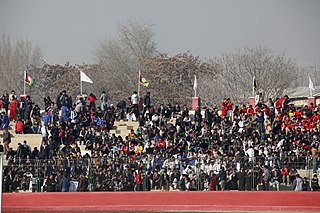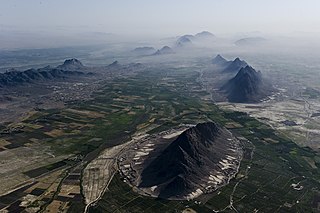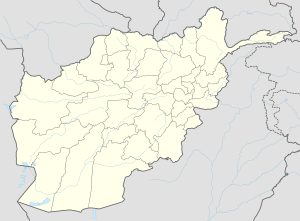
The economy of Afghanistan has had significant improvement in the last decade due to the infusion of billions of dollars in international assistance and remittances from Afghan expatriates. The assistance that came from expatriates and outside investors saw this increase when there was more political reliability after the fall of the Taliban regime. The nation's GDP stands at about $70 billion with an exchange rate of $20 billion (2017), and the GDP per capita is about $2,000. It imports over $6 billion worth of goods but exports nearly $1 billion only, mainly fruits and nuts.

The population in Afghanistan is 36 million as of 2019

Helmand, also known as Hillmand or Helman, and, in ancient times, as Hermand and Hethumand is one of the 34 provinces of Afghanistan, in the south of the country. It is the largest province by area, covering 58,584 square kilometres (20,000 sq mi) area. The province contains 13 districts, encompassing over 1,000 villages, and roughly 879,500 settled people. Lashkar Gah serves as the provincial capital.

Kapisa is one of the 34 provinces of Afghanistan. Located in the north-east of the country. The population of Kapisa is estimated to be 364,900, although there has never been an official estimate. The province covers an area of 1,842 km² making it the smallest province in the country, however it is the most densely populated province apart from Kabul Province. Mahmud-i-Raqi is the provincial capital, while the most populous city and district of Kapisa is Nijrab.

The Afghanistan Campaign Medal (ACM) is a military award of the United States military which was created by Executive Order 13363 of President George W. Bush on November 29, 2004, and became available for general distribution in June 2005. The medal was designed by the U.S. Army Institute of Heraldry.

The House of Representatives of the People or Majles-e-Namayendagan Afghanistan in Persian and Wolesi Jirga in Pashtu and Turkic, is the lower house of the bicameral National Assembly of Afghanistan, alongside the upper House of Elders.

In 2005, The New York Times obtained a 2,000-page United States Army investigatory report concerning the homicides of two unarmed civilian Afghan prisoners by U.S. military personnel in December 2002 at the Bagram Theater Internment Facility in Bagram, Afghanistan and general treatment of prisoners. The two prisoners, Habibullah and Dilawar, were repeatedly chained to the ceiling and beaten, resulting in their deaths. Military coroners ruled that both the prisoners' deaths were homicides. Autopsies revealed severe trauma to both prisoners' legs, describing the trauma as comparable to being run over by a bus. Seven soldiers were charged in 2005.

Malalai Joya is an activist, writer, and a former politician from Afghanistan. She served as a Parliamentarian in the National Assembly of Afghanistan from 2005 until early 2007, after being dismissed for publicly denouncing the presence of warlords and war criminals in the Afghan Parliament. She is an outspoken critic of the Karzai administration and its western supporters, particularly the United States.
During the 2001 Invasion of Afghanistan, many Taliban, al-Qaeda and militant fighters were captured and held at military bases in the region. On several occasions, there were instances of mass escapes.

Iron Man is an action-adventure video game based on the film of the same name as well as the classic iterations of the character. It was released on May 2, 2008 to coincide with the release of the film in cinemas. The game is published by Sega, and was released for Nintendo DS, PlayStation 2, PlayStation 3, Wii, Xbox 360, PlayStation Portable and Microsoft Windows.

Taxi to the Dark Side is a 2007 American documentary film directed by Alex Gibney, and produced by him, Eva Orner, and Susannah Shipman. It won the 2007 Academy Award for Best Documentary Feature. It focuses on the December 2002 killing of an Afghan taxi driver named Dilawar, who was beaten to death by American soldiers while being held in extrajudicial detention and interrogated at a black site at Bagram air base.

The Afghan National Army Commando Corps is an elite commando force of Afghan National Army. The Commando Corps was formed from existing Infantry battalions. The program was established in early 2007 with the intent of taking one conventional infantry kandak (battalion) from each of the regional ANA corps, giving them special training and equipment, and reorganizing based on the United States Army Rangers. Each battalion is assigned to one of the six regional corps, with the Commando Corps being the seventh military corps. The commandos comprise 7% of the Afghan National Security Forces but conduct 70% to 80% of the fighting.

Eskan is a village in Badakhshan Province in north-eastern Afghanistan. It is located in the valley of the Munjan, about 18 miles upstream of Jurm. Around the turn of the 20th century it had been a village of roughly 40 houses.

The War in Afghanistan, code named Operation Enduring Freedom – Afghanistan (2001–14) and Operation Freedom's Sentinel (2015–present), followed the United States invasion of Afghanistan of 7 October 2001. The U.S. was initially supported by the United Kingdom, Canada, and Australia and later by a coalition of over 40 countries, including all NATO members. The war's public aims were to dismantle al-Qaeda and to deny it a safe base of operations in Afghanistan by removing the Taliban from power. Since the initial objectives were completed at the end of 2001, the war mostly involves U.S. and allied Afghan government troops battling Taliban insurgents. The War in Afghanistan is the longest war in U.S. history.

The Tajik–Afghan bridge at Tem-Demogan was opened on 3 November 2002. It spans the Panj River. It was the first of four bridges planned to be built with the assistance of the Aga Khan Foundation.

Afghanistan–Turkey relations refers to bilateral relations between Afghanistan and Turkey.

On 22 April 2018, a suicide blast killed 69 people and wounded dozens more Sunday at a voter registration center in Koche Mahtab Qala, in the Dashte Barchi area of western Kabul, Afghanistan. In addition to the fatalities, at least 120 others were injured in the attack.




















